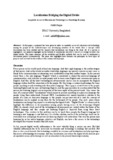| dc.contributor.author | Haque, Nafid | |
| dc.date.accessioned | 2010-10-05T05:15:22Z | |
| dc.date.available | 2010-10-05T05:15:22Z | |
| dc.date.copyright | 2007 | |
| dc.date.issued | 2007 | |
| dc.identifier.uri | http://hdl.handle.net/10361/332 | |
| dc.description | Includes bibliographical references (page 9). | |
| dc.description.abstract | In this paper, a proposal has been given to make an equitable access of education and technology among the people of the underdeveloped and developing countries of the world. Here a concept called localization has been studied and the impacts that localization can bring in the daily life of a person is highlighted. The proposal highlights on the benefits of localization and how it can act as a bridge to reduce the digital divide. This paper proposes all the available and flexible methods that can be used to implement a
localization project systematically. The paper also highlights how students can participate in these types of projects and can work for the welfare of the country and its people. | en_US |
| dc.description.statementofresponsibility | Nafid Haque | |
| dc.format.extent | 9 pages | |
| dc.language.iso | en | en_US |
| dc.publisher | BRAC University | en_US |
| dc.subject | Education and technology | |
| dc.subject | Language communication | |
| dc.title | Localization birdging the digital divide | en_US |
| dc.type | Article | en_US |
| dc.contributor.department | Center for Research on Bangla Language Processing (CRBLP), BRAC University | |

